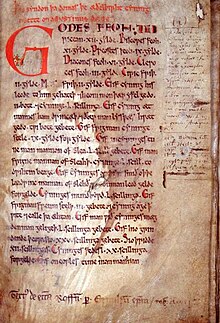
| This article is part of the series: |
| Anglo-Saxon society and culture |
|---|
 |
| People |
| Language |
| Material culture |
| Power and organization |
| Religion |
Anglo-Saxon law (Old English: ǣ, later lagu 'law'; dōm 'decree', 'judgment') was the legal system of Anglo-Saxon England from the 6th century until the Norman Conquest of 1066. It was a form of Germanic law based on unwritten custom known as folk-right and on written laws enacted by kings with the advice of their witan or council. By the later Anglo-Saxon period, a system of courts had developed to administer the law, while enforcement was the responsibility of ealdormen and royal officials such as sheriffs, in addition to self-policing (friborh) by local communities.
Originally, each Anglo-Saxon kingdom had its own laws. As a result of Viking invasions and settlement, the Danelaw followed Scandinavian laws. In the 10th century, a unified Kingdom of England was created with a single Anglo-Saxon government; however, different regions continued to follow their customary legal systems. The last Anglo-Saxon law codes were enacted in the early 11th century during the reign of Cnut the Great.